
Connecting with nature in Crete
I was born in a tiny village of 40 inhabitants in the Champagne region of France. For many people, rural France sounds like paradise but for me, it meant isolation and boredom. When I was 13, I was the youngest child in the village! My escape was always in books.
According to my mother, whenever people asked me what I wanted to do when I grew up, I always replied “I want to live abroad.” And that’s exactly what I did. I left France 30 years ago, at the age of 21. I spent a year in Northern Ireland as a French teaching assistant, before moving to Germany. Next came Ireland, then Switzerland, for a year, then back to the Emerald Isle until 2001, followed by Spain, the UK and now Portugal! I just love discovering new cultures and learning new languages.
Over the years, I was often told “you’re so competitive!” It used to upset me as I’d never thought of myself as competitive, nor did I consider it a particularly desirable quality. But it’s true that I love to push myself and this drive to push my limits, to go further still, has long been one of my strongest personality traits. I don’t call it being competitive, for me, it’s more about giving it all you have and enjoying the challenge!

Learning to take the time to relax and breathe properly
So, I lived my life according to these principles: working hard, pushing my limits but enjoying the challenges along the way. At the time of my MS diagnosis, I was working full time, studying part-time, smoking 30 cigarettes a day but also going to the gym six days a week. I was hooked on spinning, step aerobics and loved squash. During a step class, I lost control of my right foot. I remember trying to put my foot flat on the step, but it “slipped” on the side. The same happened in the following class. I also experienced painful tingling in the legs. I will never forget what my doctor told me: “It could be anything from a simple pinched nerve to something horrible like multiple sclerosis (MS). It was early 2000. I was 34 years old. I had just begun a doctoral thesis on the Irish economy with the university of Caen while teaching French at the University College Dublin (UCD). I didn’t know anything about MS.
Other symptoms appeared, colours became darker, and my vision became blurry… During a squash match with my friend Virginie, I noticed that I couldn’t see at all when the ball arrived from the top left side. It simply disappeared from my field of vision. I went to the optician, who referred me to the Eye and Ear hospital, as an emergency. I was asked to do a series of tests in front of a screen showing a checkerboard. It was like playing computer games. I later found out that these tests were ‘visual evoked potentials’, used to assess how well the optic nerve is working and how long it takes for the brain to react to a visual signal. But nobody told me anything.
The consultant who came to me at the end of the session simply told me I needed to make an appointment with a neurologist, but it was too early to draw any conclusions. I took advantage of a trip to France to visit our family doctor as I trusted him completely. Given my age and the first symptoms, he told me that an MS diagnosis was very likely. I knew he was right. I knew something was wrong. But that very same day, my older brother also went to see him and learned that he was suffering from kidney cancer. The memories of the ten months that followed are still painful. My brother died in November and it was not until February the 4th that I got an appointment with the neurologist in Dublin. I remember the exact day as it is St Véronique’s Day in France. The MRI and lumbar puncture confirmed my intuition.
“Think of MS as your friend”
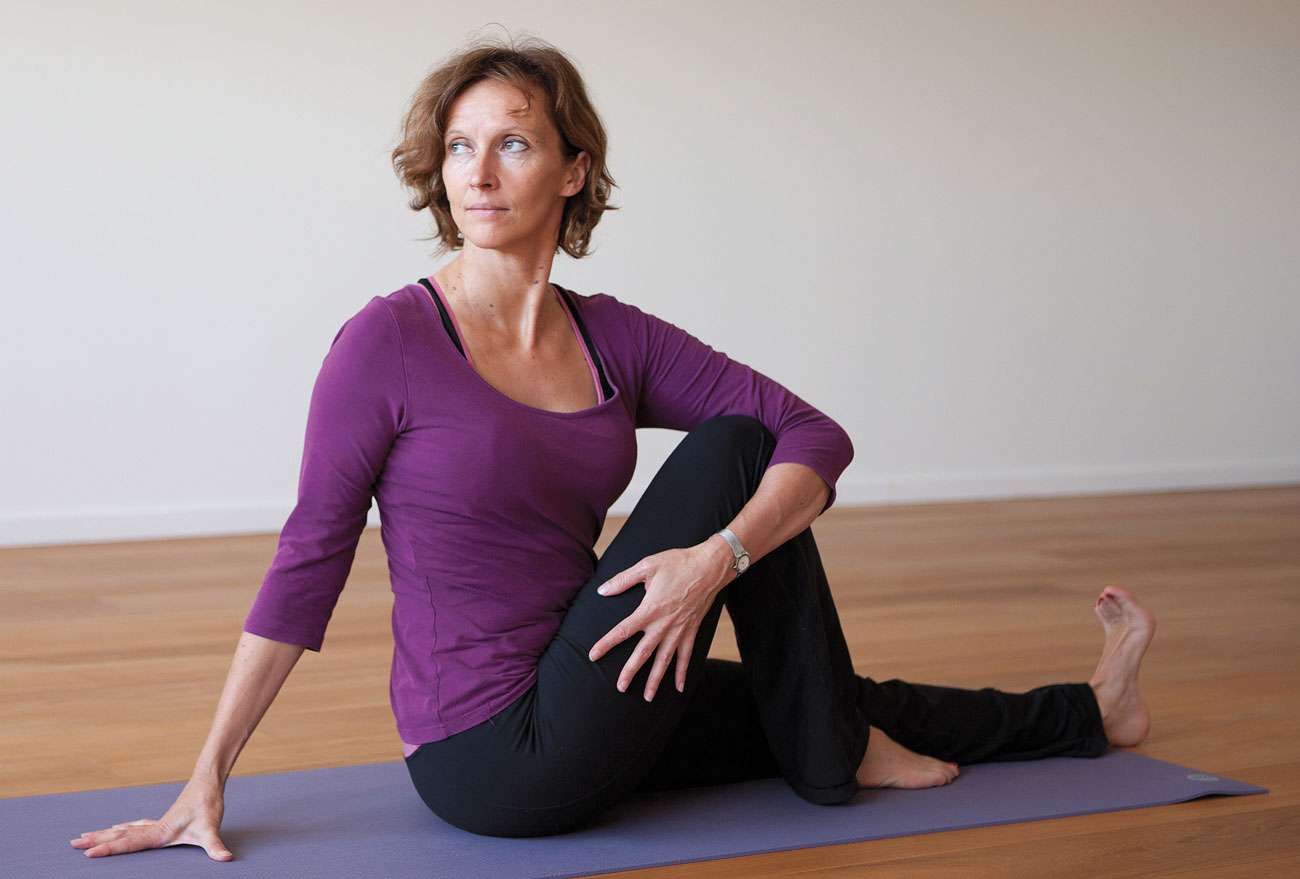
Finding stillness in a pose
When I was diagnosed with relapsing-remitting MS, I felt very lonely. I was single. I couldn’t tell my parents about what was going on as they were broken-hearted, still mourning my brother. I was also reluctant to talk to my colleagues about it for fear I might lose my job. At the time, nobody talked openly about having MS as there was still stigma attached to it. Luckily for me, a good friend brought me to the local MS Society. There I met a social worker. She gave me some crucial pieces of advice. I remember these two: “Think of MS as your friend” and “Only spend 80% of your energy. Keep the rest to cope with MS.”
But it took me a few years before I could understand what she meant. My neurologist had told me MS is an incurable condition and that the only hope was that Interferon would delay progression of the disease. A nurse taught me how to self-inject Betaseron every 48 hours. A few people suggested I should stop working, but I refused. I wanted to keep working.
“You can’t give up! You have to fight!”
New opportunities were opening up for me. Besides teaching French, I started doing research on European language policy. And nearly every spare hour I had – in the morning, evening, weekends, holiday- was for my thesis. Doing research was exciting. I attended conferences in Ireland and abroad to present papers in both European language policy and Irish studies. I met super interesting people. That was a dream life for me and I didn’t want to give up any of it. But it was really tough. Not only did I suffer from MS fatigue, blurred vision and a range of sensory symptoms but the medication sapped my energy too. I lost weight. My hair thinned. I looked like a zombie and I felt like one too.

Getting stronger and healthier . . .
Being on Betaseron was also a constant reminder that I had MS. Either I was really tired after the injection or when I wasn’t tired, I had to remember to self-inject. My PhD supervisor was very kind and told me to take a break. My boss at university was also very supportive and made sure I had access to a room where I could rest if I needed to. But I just couldn’t see any light at
the end of the tunnel.
If you’ve been to Dublin, you might have been to Howth peninsula. There is a lovely path from the village to the summit, along cliffs. As I was walking there one day, I thought how nice it would be if I just accidentally fell and… just disappeared. For the next few weeks, I planned my exit. And it felt good. Do you remember the song Mad World by Gary Jules? It was exactly how I felt.
‘And I find it kinda funny, I find it kinda sad
The dreams in which I’m dying are the best I’ve ever had
I find it hard to tell you, I find it hard to take
When people run in circles it’s a very very
Mad world, mad world’
Luckily, as I was on the verge of falling, the part of me that loves challenges just woke up “You can’t give up! You have to fight!” That’s when I decided to take charge of my health. It was in 2004.
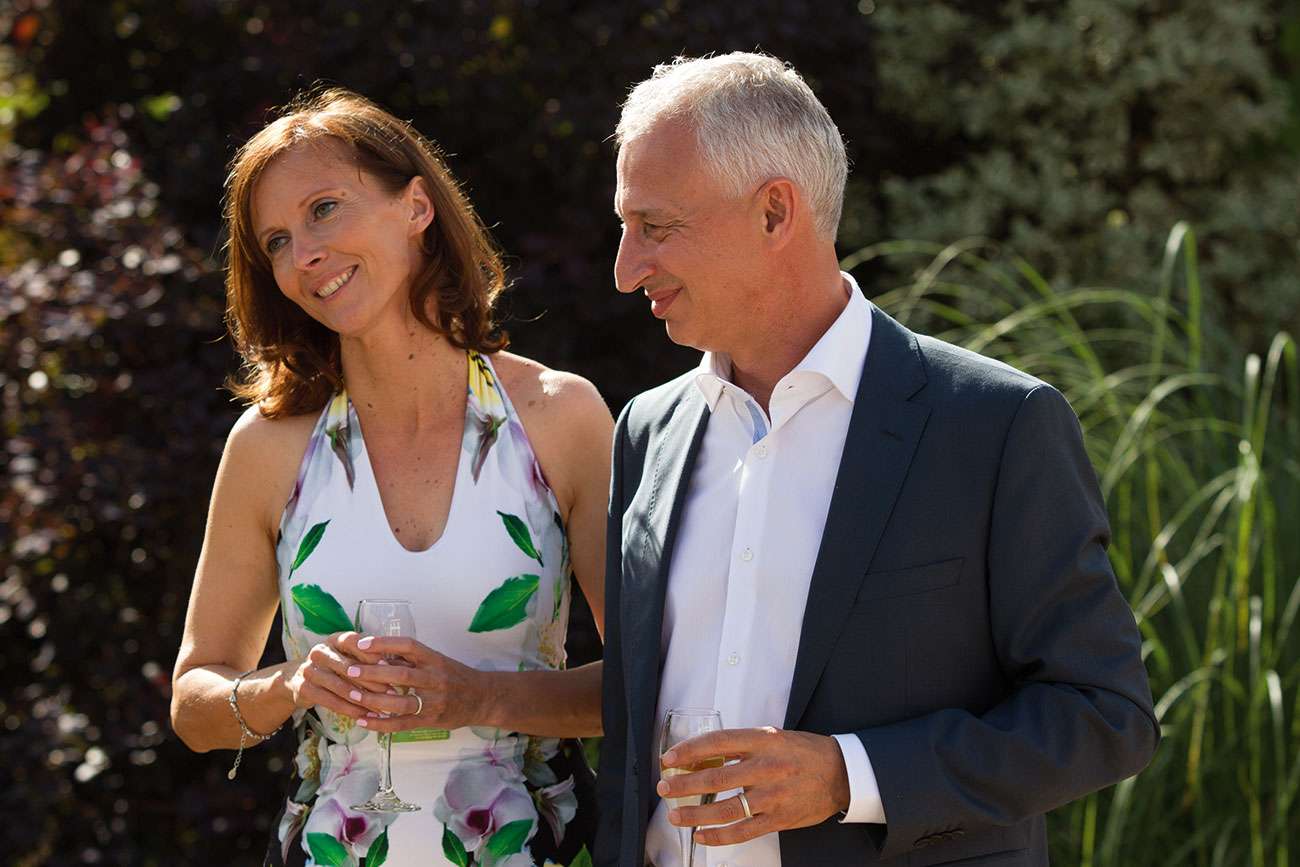
Mine and Peters wedding in our Shalford garden
I decided to stop medication and made a personal vow to do everything I could to be as healthy as possible. I let go of my beloved Gauloises blondes, changed my diet – I’m now following the Overcoming MS diet- and tried to bring balance to my life.
Little by little I found out what was working for me. The advice the social worker at the MS Society had given me started to make sense. I needed to accept that I had MS and also to manage my energy better. Yoga was a great help! I had started yoga after being diagnosed with MS, as an alternative to step aerobics and spinning. Yoga helped me reconnect with my body and to some extent, to become friends with it again. It also helped me relax, step back, and enjoy the present moment. I learned to recognize the postures and breathing techniques that could alleviate some symptoms. I became convinced that yoga could help me get stronger, healthier and happier. And looking back over the years, I now believe that yoga helped to trigger the natural healing force in me, the force that Hippocrates described as: “The natural healing force within each of us (that) is the greatest force in getting well”.
Slowly my energy and fitness levels improved. In 2008, I finally finished my doctoral thesis and got the congratulations of the jury! Personally, it was a big victory. I hadn’t given up and it was also the end of a major source of stress. I felt relieved! Professionally, it didn’t change much as I had become disillusioned with academia and didn’t want to pursue an academic career. I became the editor of a magazine that teaches French and later moved on to eLearning design. But one career isn’t enough, is it? So, I decided to train to become a yoga teacher too. Yoga has helped me so much that I want to share the benefits with other people with MS.
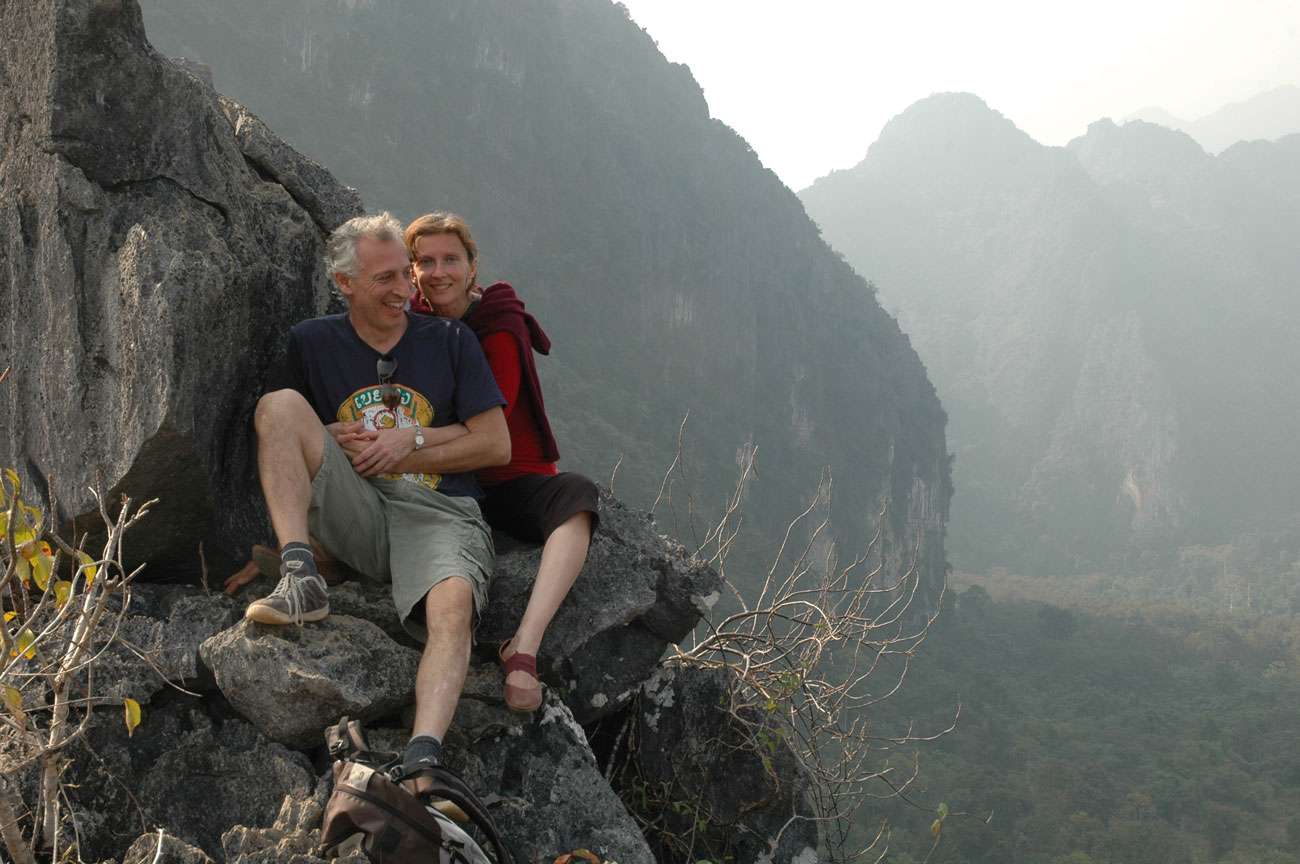
In Laos, feeling ‘on top of the world’
A few months before being officially diagnosed with MS, I had a wonderful dream.
I was walking with a friend towards a house, a detached house, with outside steps on the right side, leading down to a small garden. My friend disappeared but I walked down the steps. The garden was barren with two miserable trees. No foliage.
A double garage door was the only way in the house, so I ventured in. As I entered the basement, an enormous female walrus slowly wobbled towards me. My God, she was the most impressive being I had ever seen! The top of her head nearly reached the ceiling. Each time she got closer, her whole gelatinous body quavered as if moved by an invisible wave. I couldn’t move. I couldn’t talk. I could only watch her. She had a friendly tusk-less face. She stopped close to me and gazed at me through long eyelashes. I could sense that she didn’t want to scare me, on the opposite. But she was so huge! Then she started to talk and told me a riddle. Deep down, I knew that I only had to solve this riddle for her to let me walk on… And then, I woke up.
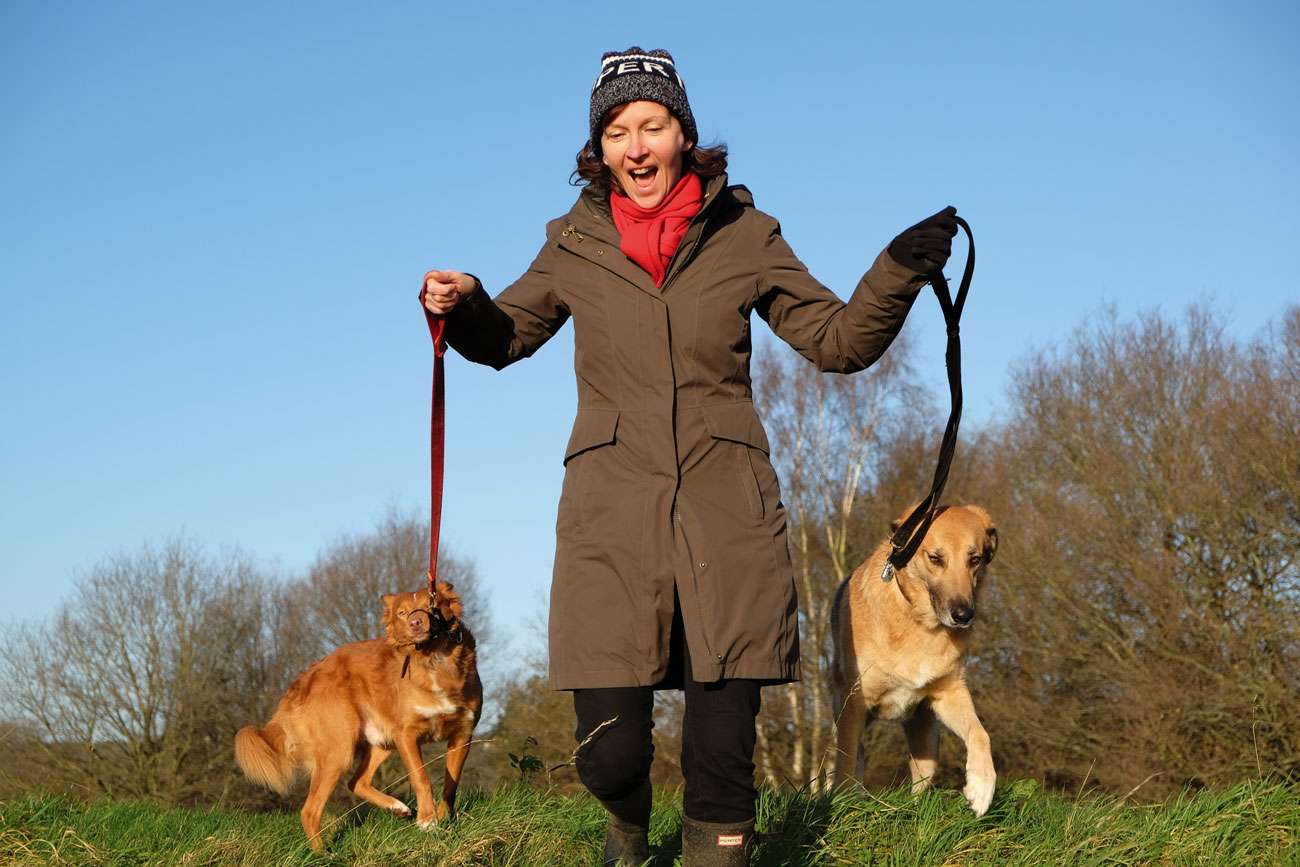
Having fun with our dogs in Surrey
I had forgotten the riddle! I believe in this dream. If MS were an animal, it would be my walrus, huge, shapeless, impressive but friendly. In a way, this dream sums up what MS has taught me: your fear is your worse enemy, trust yourself.
The last time I saw my Irish neurologist in 2012, he asked if I would accept to do another MRI scan, just to see how many lesions I had. To his surprise, I had fewer than in 2000. I don’t know if an MRI scan would now reveal new lesions but the one thing I do know is that I feel much stronger and better than ever before. I even ran my first half marathon last year. It was hard and I experienced various sensory symptoms but I finished the race. And I keep training. Back in 2000, I would never have imagined that possible. Secretly I’m even thinking that maybe one day I could run the Berlin marathon… but hush! I don’t want anybody to think I’m competitive!!!
I met my husband Peter in 2012 as I volunteered in the Yoga retreat centre he opened in Spain with my yoga teacher. He always says that I was the hardest working volunteer and that’s why he married me! Although he doesn’t practice yoga, he’s been a keen meditator for 25 years and inspires me to live in the moment.
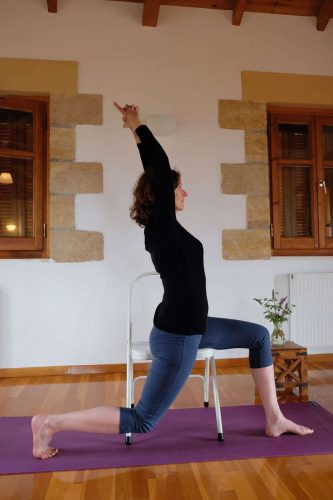
Adapting yoga for all level of abilities
Four years ago, we moved to Shalford. We really enjoyed living there and met lots of wonderful people. Peter could play cricket again. We discovered the Cranleigh magazine too! But we both wanted another lifestyle. So, we decided to move to the Algarve in June. We found a beautiful farmhouse in a small village called Amendoeira, outside Loulé. We’re now busy renovating it into a guesthouse / retreat centre.
We want to create a ‘healing space’ where people – especially people with MS – can come and experience the benefits of a healthy lifestyle and spend the day eating organic food from our garden and orchard, doing yoga, meditating or relaxing by the natural pool or going for a walk in the hills and visiting the nearby market town. This is our dream and every day, we move closer to it. We hope to open our doors next year.
Our dream is to create a ‘healing space’ in Amendoeira, near Loulé in the Algarve.
For further information contact Veronique Gauthier-Simmons E-mail: or visit www.tamingthewalrus.com











